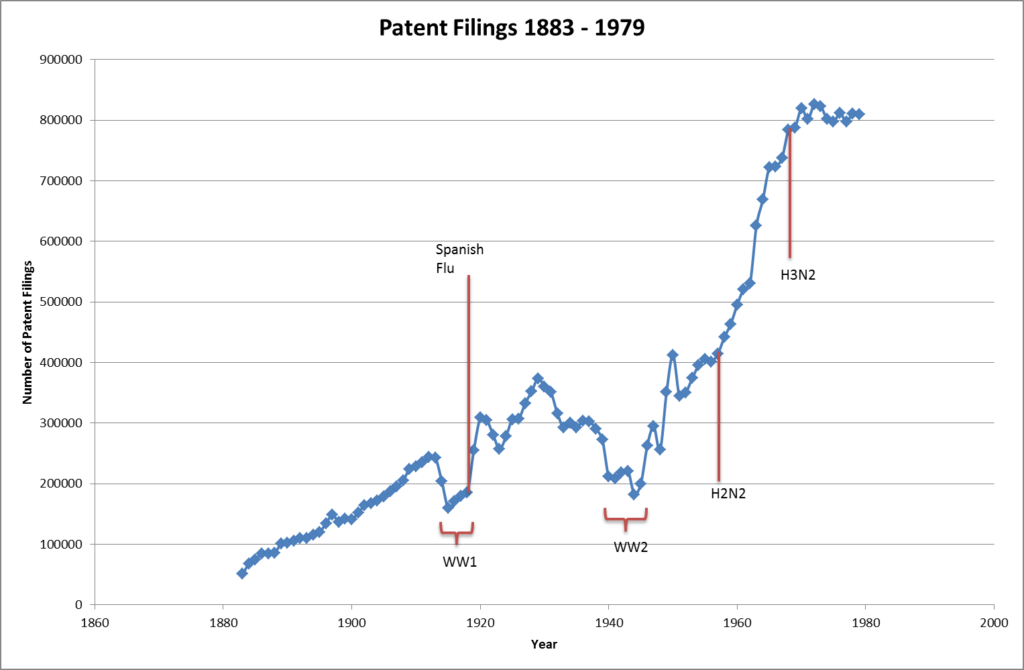Changes to SPCs and Marketing Authorisations in the UK implemented on 1 January 2025
13th January 2025

It appears the general assumption is that the COVID-19 pandemic will have a significant effect on the level of patent filings over the course of the next twelve to eighteen months. Some gloomy predictions foresee a drop of 10%-20% in global patent applications. With patent filings acting as a lagging indicator of innovation in general, are we to expect a period of limited innovation, or is there perhaps room for some optimism?
History may suggest that, whilst major events such as the present pandemic can indeed have an effect on patent filings, there is also evidence that innovation may still thrive in such circumstances. The World Intellectual Property Organisation (WIPO) maintains records in relation to patent filings dating back to 1883. The chart below has been compiled using the WIPO data and details worldwide patent filing numbers from 1883 to 1979. Some key events which may be somewhat analogous to the current crisis have also been highlighted.
Firstly, looking at other pandemic events, the H2N2 and H3N2 outbreaks appear to have had a minimal effect. We can also see that the onset of the Spanish Flu, perhaps closest to COVID-19 in terms of its impact on general productivity, actually corresponds to a spike in patent filing activity. The Spanish Flu pandemic spanned the period 1918-1920, however patenting activity increased by 3% in 1918, almost 40% in 1919, and over 20% in 1920. Some of these increases may be due to World War I coming to a close, however it still provides evidence that current events may not stifle innovation as much as may be thought.
Looking at World War I and II, we can see a noticeable detrimental effect on the level of filings. However, after initial drops, slight upwards trends can still be seen even during the war years. Perhaps even more importantly, the end of each war signalled significant spikes in filing activity. Again, as patent filings may be seen as a lagging indicator of innovation, this would suggest that innovation continued throughout both of these major events.

So, there appears to be glimmers of positivity in the historical data but why would this be the case? Why does innovation continue against the odds?
One reason may be that, in a crisis, incentive exists for manufacturers to provide products outside of their typical offerings. In the case of the current pandemic, many businesses have responded with great enthusiasm and devised innovative ways in which they can leverage their existing expertise, skills, and equipment to produce new products aimed at helping to fight the COVID-19 virus.
In short, innovators love problem solving and a crisis provides plenty of new problems to solve. In the UK for example, a government supported consortium encouraged the development and manufacture of ventilators. As part of this project, the home appliance manufacturer Dyson developed a ventilator in 10 days. Not only does this illustrate companies innovating outside of their core industries, but it also demonstrates that such innovation can take place at an unprecedented rate during a crisis.
This leads us to another point. The ventilator scheme discussed above involved Airbus, Microsoft, Siemens, Rolls Royce, Unilever, Vauxhall, and multiple Formula 1 teams. This is just one example of enhanced co-operation and information sharing which has resulted form the current crisis.
In terms of IP, the “Open COVID pledge” is intended to encourage business and academia to pledge to make their intellectual property available free of charge for use in ending the COVID-19 pandemic, and minimising the impact of the disease. Many major companies have signed up, making available thousands of patents. Major universities have also announced greater access to their IP portfolios. Such co-operation, information sharing, and openness can only act to foster innovation.
It is also likely that any continuing innovation is not solely limited to the development of pandemic fighting technology. There are undoubtedly negative impacts to be expected from a slowing in normal activity within companies. However, for some, relaxation of the relentless focus on day to day operations may free time and resources which can be utilised to explore innovative ideas.
Forward thinking companies may use the slowing of general activities to innovate. Resultantly, such companies may exit the current crisis with potential new product lines or improved manufacturing processes. Moreover, some may be forced to diversify as the unique circumstances encourage the use of innovation to enter entirely new markets.
Nobody can predict with certainty what impact the current crisis will have on patenting activity, and in the short term some negative ramifications may be felt. However, there is reason to believe that innovation will not only continue to thrive even in these most difficult of times, but may also act as a tool to help limit the damage caused.